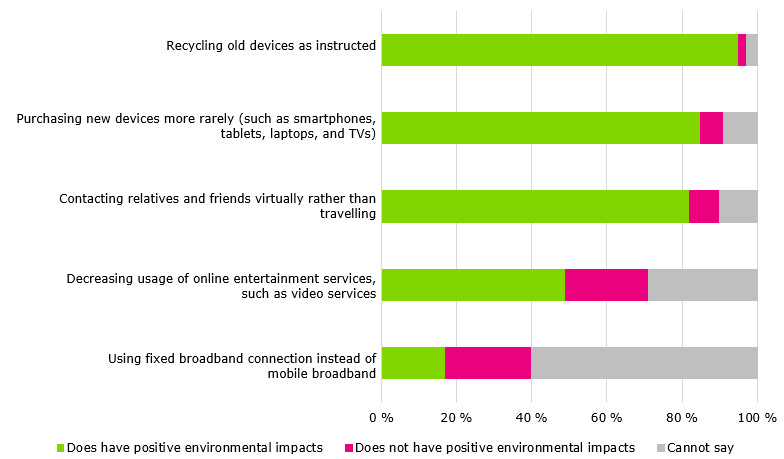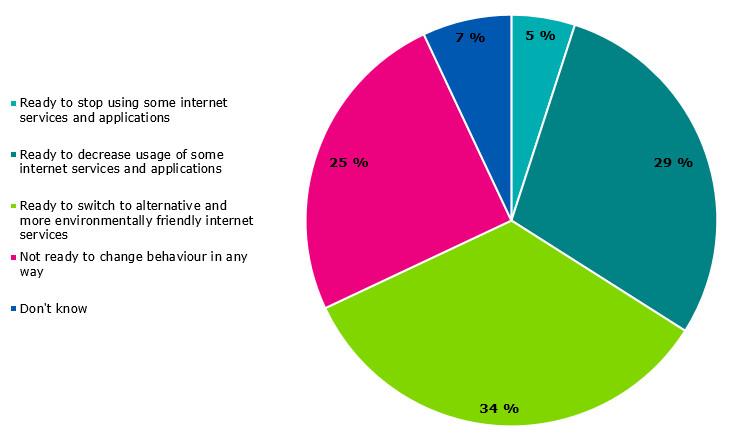According to a survey by the Finnish Transport and Communications Agency Traficom, Finns need more information on the environmental impact of IT devices and services. The environmental impact connected to the energy consumption of internet services is clearly more difficult to understand than the life cycle impact of terminal devices from manufacture to recycling. Up to 68 per cent of Finns could change the way they use internet services if they had access to more information.
The survey mapped Finns’ views on the environmental impact of devices and services in the field of ICT. In addition, the survey contained questions on service usage volumes, the frequency with which devices are replaced and the recycling of devices.
The environmental impact of terminal devices is understood – the impact of internet usage is more difficult to grasp
Finns agreed that the extended use and recycling of various terminal devices (e.g. smartphones) has a positive impact on the environment. Indeed, recycling and electronic scrap are familiar themes to many. Reduced traffic as a result of remote meetings is also seen as a positive in terms of the environment.
However, the respondents did not find common ground when it came to services and network technologies. Roughly half of the respondents believed that decreasing the use of video services would generate positive environmental effects. Around 60 per cent of Finns did not know whether a fixed internet connection is more environmentally friendly than a mobile connection.
Transmitting video over an internet connection requires more data transfer than transmitting text content, for example, resulting in video processing consuming more energy in networks and server rooms. Research also shows that data transfer in the mobile network consumes more energy than transmitting data over a fixed broadband connection.
According to the results, consumers find the environmental impacts related to the service life and recycling of devices or to other matters perceived as tangible, such as reducing traffic, easier to grasp. By contrast, effects related to the use of internet services and the connection used (fixed/mobile) are more difficult to understand.

Most Finns felt that there is no reliable and clear information available about the environmental impact of ICT. Fifty-five per cent of Finns were at least somewhat interested in more information on the environmental impact of the ICT sector, and the majority of Finns were at least a little interested in this information. The amount and content of the information is different for devices and services.
Consumers want alternative, environmentally friendly services
Merely increasing the amount of information will not, however, lead to reduced harmful effects on the environment if the information does not lead to changes in behaviour. Public administration, companies and consumers all play a critical role in reducing the environmental impact of the ICT sector.
A clear majority (68 per cent) of Finns would be prepared to change the way they use internet services if they had more information on the environmental impact of their choices. The respondents were most prepared to replace services with more environmentally friendly services or reduce the use of some services. One fourth of Finns was not prepared to change the way they use internet services at all. The all-pervasive nature of digitalisation may reduce the pace of behavioural changes.
“The survey clearly indicates that Finns are quite savvy to the environmental impact of ICT devices and internet usage and want to act responsibly. This is a delightful trend, as Finland strives towards its environmental goals. At the same time, many continue to need more information on the impact the service life of digital devices and services has on the environment and climate. The importance of reliable, understandable and current information is highlighted as everyday life becomes increasingly digital – here at Traficom we want to do our part in providing that information,” said Jarno Ilme, Director of the Sustainable and Clean Environment Network at Traficom.

Research background
The ICT sector is seen as having an opportunity to reduce harmful environmental effects and ensure energy efficiency. The infrastructure and number of devices required by the ICT sector as well as the services it produces cause emissions and other harmful effects to the environment. Even though the energy efficiency of the digital infrastructure is constantly improving, there is no guarantee that it can keep up with increasingly growing internet usage. Improving energy efficiency is not enough if the overall emissions keep increasing. In addition to energy consumption, the ICT sector requires considerable amounts of devices for both building and using networks and services.
It is the consumers that will ultimately choose what kind of devices and services are offered to them and how much they are used. In late summer 2020, Traficom commissioned a consumer survey on consumer behaviour in terms of ICT sector services and devices and consumers’ interest in environmental issues to support the ICT sector, climate and the environment strategy being prepared by the Ministry of Transport and Communications. The consumer survey on environmental issues was carried out by IROResearch Oy in August and September 2020. The survey was conducted by interviewing 2,000 people aged 15 or over by telephone.
Enquiries
Jarno Ilme, Director of the Sustainable and Clean Environment Network, jarno.ilme(at)traficom.fi, tel. +358 29 539 0574
Marja Heinonen, Communications Market Specialist, marja.heinonen(at)traficom.fi, tel. +358 29 539 0306